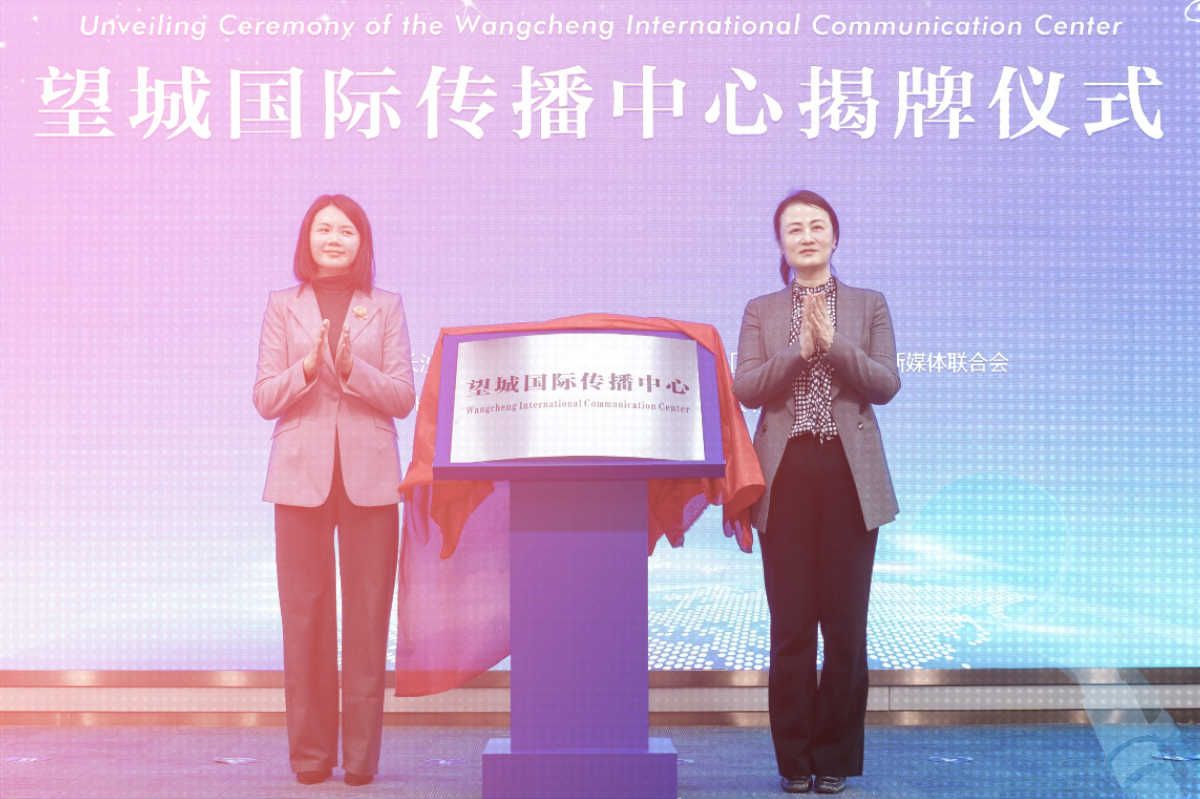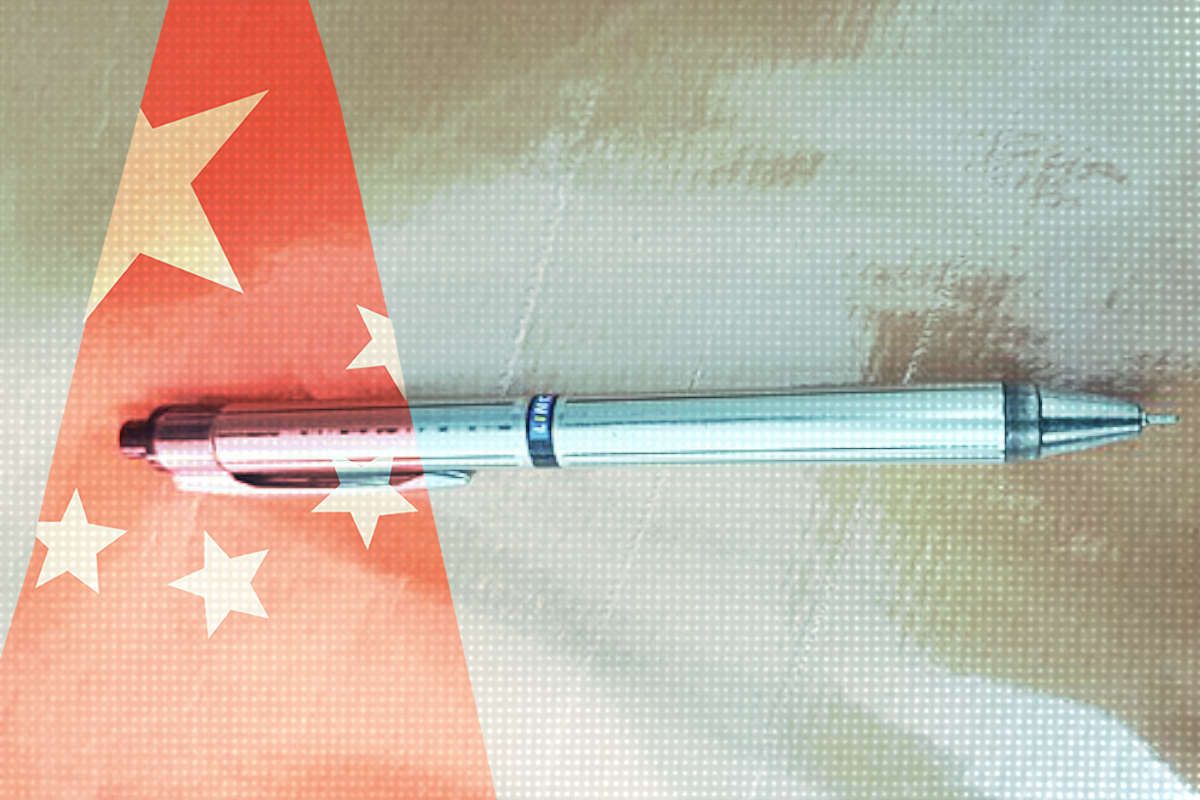Headlines and Hashtags
People's Daily cheers for Richard Liu
China’s press control authorities often criticise the media for excessively commercial behaviour, for trying to “attract eyeballs,” as the phrase goes in Chinese, or xiyin yanqiu (吸引眼球). But such opportunism is not, as they often wish to believe, something found only on commercially-driven websites and public WeChat accounts. Party and state-run media can also veer into sensationalism as they endeavour to make their voices heard above the cacophony. This week, we have one interesting case from Hunan’s Party-run Xiangyang Daily (襄阳日报), which seemed a bit too exuberant as an online diary from one of its reporters was shared by the WeChat public account of the flagship People’s Daily newspaper, receiving more than 100,000 views.
It should surprise no one that Party media can also leap to premature conclusions in ways that are woefully misleading. Such was the case on December 21, as local prosecutors in the U.S. announced that they had insufficient evidence to charge Chinese internet entrepreneur Liu Qiangdong in the alleged rape of a Chinese student at the University of Minnesota. Either not understanding that insufficient evidence is not tantamount to a public statement of innocence, or wilfully twisting the news in favour of a homegrown entrepreneur, a news app operated by the Chinese Communist Party’s official People’s Daily newspaper made a post that bore the headline: “Liu Qiangdong is Innocent!”
Also this week, we can now see a very, very sharp decline in advertising revenues for satellite TV networks in China. The top take by a TV network in recent advertising auctions for 2019 was just half of what the top network took in last year.
THIS WEEK IN CHINA’S MEDIA
December 15-21, 2018
➢ Prosecutors in the U.S. decide not to charge Chinese internet entrepreneur Richard Liu, People’s Daily news app leaps to suggest his innocence
➢ Regional Party newspaper draws criticism after congratulating itself on big numbers for a tragic story
➢ Television Stations Face Sharp Advertising Revenue Drop for 2019
➢ Tibetan monks, nuns and temples receive honours for demonstrated loyalty to the Chinese Communist Party
[1] Prosecutors in the U.S. decide not to charge Chinese internet entrepreneur Richard Liu, People’s Daily news app leaps to suggest his innocence
On December 21, prosecutors in Minnesota’s Hennepin County announced that they would not charge Chinese internet entrepreneur Liu Qiangdong, known also as Richard Liu, who was accused back in September of raping a Chinese student at the University of Minnesota, where he had been taking a management course. Liu is the founder of JD.com, one of China’s leading e-commerce sites.
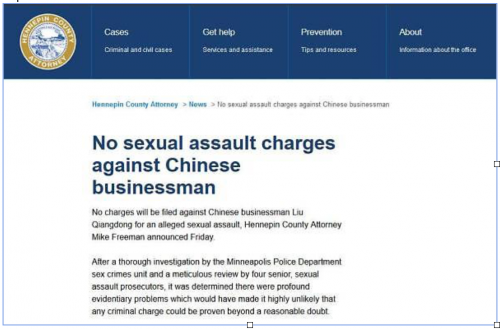
Prosecutors said they had found insufficient evidence to charge Liu. “As is the case in many sexual assault incidents, it was a complicated situation,” the attorney for the country, Mike Freeman, said in a prepared statement. Quoted by the Associated Press, Wil Florin, the lawyer representing the alleged victim, said they would pursue a civil case in the United States against Liu and his company.
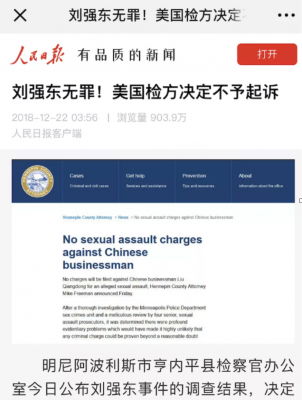
At 3:56AM Beijing time on December 22, a news app operated by the Chinese Communist Party’s official People’s Daily newspaper made a post called “Liu Qiangdong is Innocent! Prosecutors in the U.S. Decide Against Prosecution” (刘强东无罪!美国检方决定不予起诉), which misled readers by suggesting a case could not be pursued against Liu Qiangdong because he is innocent. The news app story also relayed only the response from JD.com following the decision, and did not include a response from the plaintiff.
As media inside China reported the news to suggest that Richard Liu’s innocence had been confirmed by the decision, the WeChat public account of China Women’s News, the official newspaper of the All-China Women’s Federation, criticised Liu for his moral lapses, saying that his conduct had seriously damaged his family, particularly his wife, and had also placed his company and its shareholders in jeopardy. “From the standpoint of family values and professional ethics,” said the account, “there are still many areas where Liu Qiangdong needs to reflect and wake up.”
Key Sources:
WeChat public account “News Lab” (新闻实验室): 如何做“有品质的新闻”:以“不予起诉刘强东”为例
WeChat public account “China Women’s News” (中国妇女报): 中国妇女报独家点评刘强东事件:法律的后面还有道德
The Paper (澎湃新闻网): 美国检方决定不起诉刘强东:存在证据问题,嫌犯称双方自愿
AND: 女方律师批美检方不起诉刘强东:这就是为何性侵受害者怕出面
[2] Regional Party newspaper draws criticism after congratulating itself on big numbers for a tragic story
“Living Toward Death: A Journalist’s Hospital Diary” (向死而生,一名记者的住院日记), a website set up by Yan Junjie (严俊杰), a reporter for Hunan’s Party-run Xiangyang Daily (襄阳日报), to document his own illness and stay in the hospital drew a rare degree of public interest in China to the pressures facing journalists.
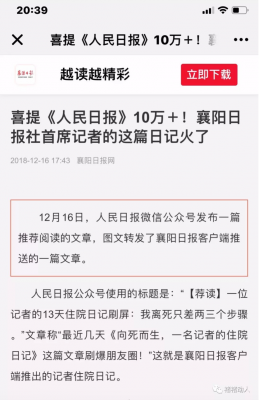
On December 16, the WeChat public account for the Party’s flagship People’s Daily compiled reports of Yan and his site by Xiangyang Daily under the headline “One Journalist’s Diary of a 13-Day Stay in the Hospital Makes a Splash: I Was Three or Four Steps from Death” (一位记者的13天住院日记刷屏:我离死只差两三个步骤). The post received more than 100,000 visits that day alone. The same day, Xiangyang Daily followed up with a story on its website that called attention to the attention its own story had received at the People’s Daily WeChat account. The headline of the article read: “Wow, 100,000+ at the People’s Daily: Xiangyang Daily journalist’s diary is hot stuff” (喜提<人民日报>10万+,襄阳日报社首席记者的这篇日记火了). The online story quickly drew a great deal of attention, with many responding that it was opportunistic and sensational of the newspaper and the People’s Daily public account to treat a journalist’s health woes as selling point. The online story was later deleted by the newspaper, and the headline on its news app was changed to the far less eye-grabbing: “With attention from the public account of People’s Daily, a journalist’s hospital diary generates a huge discussion about health” (人民日报公号关注,记者住院日记引发健康大讨论).
Writing on his WeChat public account, journalist Chu Zhaoxin (褚朝新) said: “What is there to rejoice in about relying on a journalist’s description of his own tragic illness to draw attention and high traffic?”
Judging from his bylines at Xiangyang Daily, Yan Junjie is assigned to cover current affairs, and he often accompanies the city’s top leader, Party Secretary Li Lecheng (李乐成), on his official events.
Key Sources:
WeChat public account “Old Chu Has His Say” (老褚说事): 襄阳日报,真的是病得不轻
WeChat public account “People’s Daily” (人民日报):【荐读】一位记者的13天住院日记刷屏:我离死只差两三个步骤
Phoenix Online (凤凰网):媒体庆贺“记者住院日记”喜提10万+,是种堕落丨凤凰网评论
TouTiao public account “Vertical News” (纵向新闻): 地方党报首席记者病中日记被央媒转载,报社“蹭热点”遭批很委屈
[3] Television Stations Face Sharp Advertising Revenue Drop for 2019
The Wechat public account “Mirror Image Entertainment” (镜像娱乐) reported this week that advertising auctions by satellite television networks in China for 2019 have shown a marked drop in interest from advertisers. According to available figures, Hunan TV, the top-performing network in last year’s auction, raising a total of 5.69 billion yuan for 2018, drew in just 1.3 billion yuan at its recent auction, down 77 percent. Moreover, this year’s action leader, Beijing Satellite TV, drew in a total of just 2.3 billion yuan, just half of what Hunan TV managed to draw as the auction leader last year.
The reasons for the dramatic drop in advertising buys is directly related, according to industry experts, to the navigation of users away from satellite TV and the corresponding drop in ratings. Another important factor, they said, was the revelation this year of rampant ratings manipulation and falsification by television stations, which significantly impacted the trust of advertising buyers’ in the reliability of ratings figures.
Key Sources:
WeChat public account “Mirror Image Entertainment” (镜像娱乐): 2019卫视招商困境:签约额骤降、90%资源流向互联网,卖方市场转为买方市场
[4] Tibetan monks, nuns and temples receive honours for demonstrated loyalty to the Chinese Communist Party
On December 21, an “honor convention” (表彰大会) was held in Tibet to award monks, nuns and temples for their study and implementation of the so-called “Four Standards” (四条标准), referring to President Xi Jinping’s policy on religion in the semi-autonomous region, which demands: 1) political reliability (政治上靠得住), religious attainment (宗教上有造诣), 3) moral character convincing to the masses (品德上能服众) and 4) being useful at the critical moment (关键时起作用).
At the. event, 7,034 monks and nuns and 70 temples were honoured as having followed the Four Standards as part of an enforcement campaign underway since December 2017. A further 200 Party cadres serving oversight roles at temples in Tibet were given honours at the ceremony.
Key Sources:
China Tibet Online (中国西藏网): 西藏70座寺庙和7034名僧尼获表彰
Tibet Daily (西藏日报): 吴英杰在全区“遵行四条标准 争做先进僧尼”教育实践活动学习交流座谈会上强调 践行总书记“四条标准”增进“五个认同” 争做新时代的好公民和受人尊重的宗教人士

















